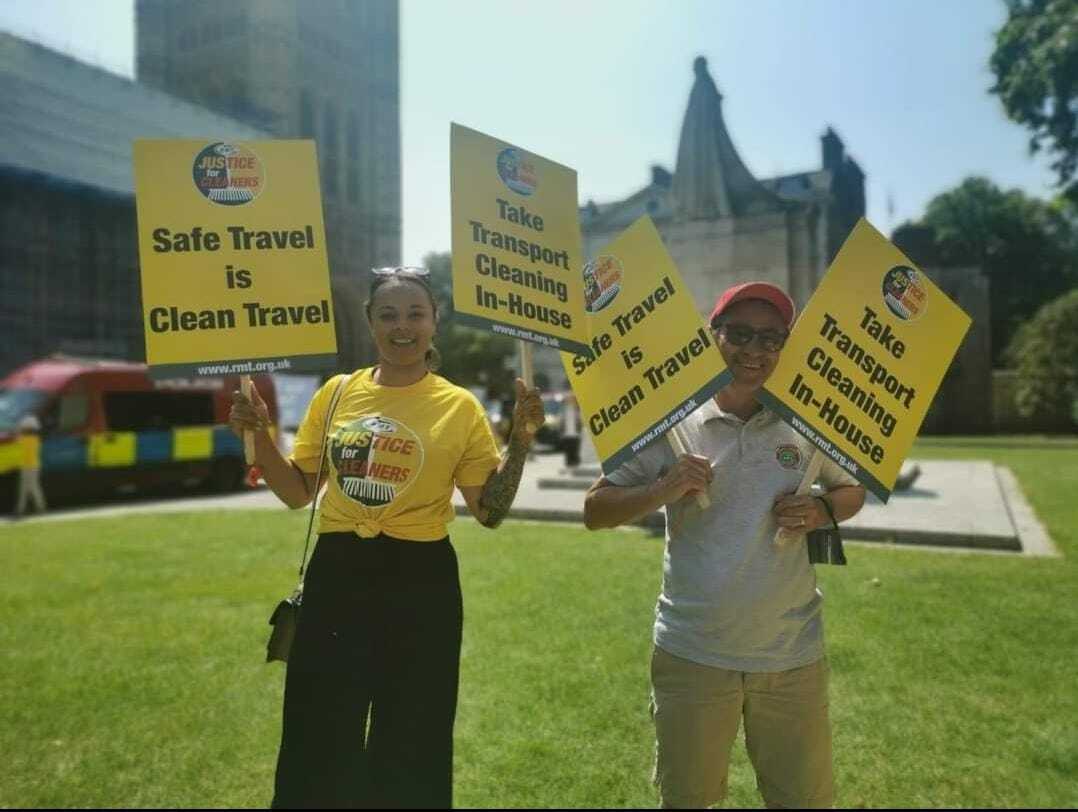There’s Another Rail Strike You Haven’t Heard About
Outsourced cleaners are fighting for £15 an hour.
by Polly Smythe
3 November 2022

When train cleaner Bella Fashola gets on a Govia Thameslink train at Hastings, East Sussex, she has around eight minutes to get it clean. Each train is normally made up of four coaches, although on days where there’s a football match, that number can be as high as eight. Each coach contains two bins to empty and four or five tables to sanitise. Then there are toilets to clean – one or two per train. Fashola must wear gloves and a backpack, while holding a rubbish bag in one hand, and a carriage key that opens bins in the other. She says “you’re never going to be able to do a thorough clean. You’re always going to be rushing.”
With no sick pay, inadequate uniform provision, exposure to dangerous chemicals, chronic understaffing and earning minimum wage, Fashola and her colleagues have had enough. During the pandemic they started organising with the RMT for £15 an hour, company sick pay, and help with travel to work.
In February of this year, long before the rest of the railway went out on strike gaining national media attention, Fashola and other cleaners employed by facilities management company Churchill working on Thameslink, Southern and Great Northern, Southeastern, Eurostar and HS1 services held a 24-hour strike. Two months later in April, the cleaners struck again, this time for 11 days. In July, cleaners took a further five days of strike action.
Cleaners alone can’t bring the railways to a halt. When contractors and TOCs are happy to run filthy trains, it’s harder to leverage the withdrawal of labour. Meanwhile, Fashola says public sympathy isn’t always easy to come by. “When you say to the public that you want a pay rise, they say, ‘well the trains are always dirty anyways.’ But they don’t understand why that is,” she says.
Nevertheless, what started at Churchill has culminated into the potential of a nationwide strike. On 28 October, the RMT launched a national cleaner’s strike ballot. The union is balloting over 1700 cleaners who are contracted out, working for Atalian Servest, Bidvest Noonan, Carlisle, Churchill and Mitie on 12 separate contracts.
Organising has been hard work. On the Churchill contract alone, there are around 40 different nationalities. “Outsourced workers are mainly Black and ethnic minorities,” says Fashola. “That’s what the companies choose as their business model, because they think that by employing Black and ethnic minority workers, they will be too scared to ever organise for themselves.” But a few of Fashola’s fellow organisers speak multiple languages, giving the union a broad reach. When she realised not all the cleaners being balloted were able to read or write, Fashola pivoted to making videos about the strike.
“When I first went to Victoria station to talk to cleaners about the union, they were very hostile, shouting at me ‘we don’t want a union’,” says Fashola. “Now, we have around 98% membership there.”
While the cleaners being balloted are contracted out across different companies, the conditions they face are similar. A recent RMT survey of over 1,000 cleaners found that 84% are struggling to make ends meet, with more than one in 10 using food banks.
With most outsourcing contracts awarded on a five-year basis, companies underbid to secure their contract, cost-cutting by reducing staff numbers. “We’ll end up with one cleaner in Hastings and one in Euston.”
“Understaffing means cleaners end up doing work they’re not supposed to, like cleaning while the train is in motion,” says Fashola. “You can’t take pride in the job. The tools and the staffing levels just aren’t there.”
Fashola says that at one depot with RMT members, where cleaners work gruelling night shifts performing intensive cleans of the driver’s cabs, carpets, and refill train toilets with water, staff numbers have been cut from 17 to seven.
These conditions are the result of outsourcing, Fashola says. In 1993, with the privatisation of the railways, train operating companies (TOCs) sought to reduce their costs. With cleaning seen as a ‘non-core’ service, where outsourcing wouldn’t impact the ‘core’ service of running the trains, TOCs outsourced a range of cleaning, from quick turnaround day train cleans, to station cleaning, overnight depot train cleans, and deep cleans.
Unlike other rail industry staff, cleaners do not receive free travel. In September, London Mayor Sadiq Khan announced that London Underground cleaners will receive free travel on Transport for London services, and could possibly be brought in-house early next year. There are no signs of a similar move for cleaners on the rest of the rail network.
The result of the national ballot will be announced November 22.
Fashola says, “Once cleaners are confident enough to stand on the picket line together, you’ve already won, and the company has already lost,” says Fashola. “Even though the company hasn’t given us an offer yet, we’ve still won. And we’ve done that by showing workers that you can organise yourself. Five voices are bigger than one.”
Polly Smythe is Novara Media’s labour movement correspondent.


